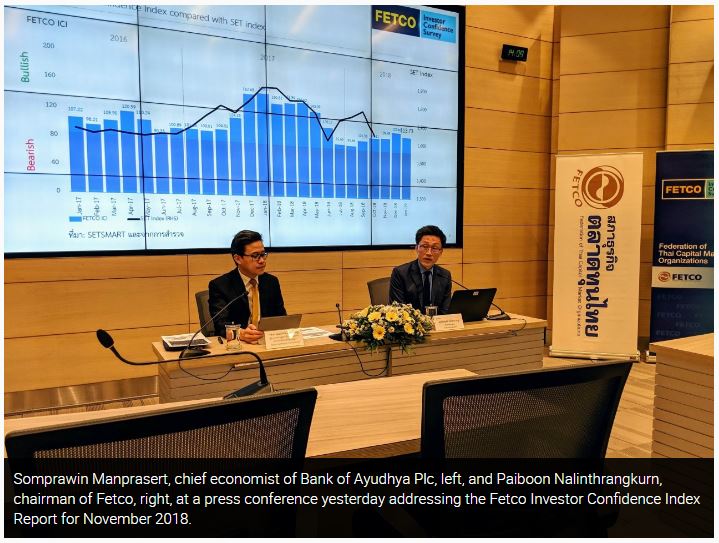Thailand: War hits investor confidence index
INVESTOR CONFIDENCE has fallen for the first time in five months amid the ongoing US-China trade war and rising US interest rates.
The Federation of Thai Capital Market Organisations’ (Fetco) Investor Confidence Index (ICI) for the next three months (through to January 2019) fell into the neutral zone, decreasing by 7.23 per cent to 113.73.
This marks the first fall in the ICI in five months with the impact of the US-China trade war and US monetary policy cited as key factors eroding investor confidence.
The trends in investor confidence by type of investor shows that the ICI for retail investors took the sharpest hit, falling by 17.66 per cent from 131.46 in September to 108.24 in October. The ICI for foreign investors, however, rose by 4.17 per cent, from 120 in September to 125 in October.
“The ICI for the next three months fell into neutral territory as investors are worried about the impact of the ongoing US-China trade war, which has negatively impacted the global stock markets,” Fetco chairman Paiboon Nalinthrangkurn said yesterday at a press conference. “This certainly has negatively impacted Thai trade, as seen in the fall in export growth in September,” he said.
In September, Thailand’s exports fell for the first time in 19 months, shrinking by 5.2 per cent compared to the same period last year, according to the Commerce Ministry.
“However, it is the uncertainty which comes with the trade war that has dragged down investor confidence,” said Paiboon.
The latest round of tariffs imposed by the US and China occurred on September 24 when both parties hiked tariffs by 5 to 10 per cent. There is a possibility that if the current trade war escalates, tariffs may rise to 25 per cent between the two countries in January next year, according to Somprawin Manprasert, chief economist at Bank of Ayudhya Plc.
“The uncertainty from the trade war mainly concerns to what extent US and Chinese companies can cope with the rising tariffs, as well as the impact on Thai manufacturing and exports as a result of the shifting supply chain,” Paiboon added.
“Another issue that has dragged the ICI down are concerns over the US monetary policy,” he said. “The Fed has signalled it will hike US interest rates once again before the end of this year.
“Investors are concerned that the rise in interest rates may damage the economic growth of the US and lead to negative impacts on the global stock market,” he said.
Despite these concerns, developments in Thailand’s domestic market are what investors see as the most influential positive factors driving Thai stocks. The ICI found that industrial sectors most attractive to investors are energy, banking and tourism, according to Paiboon.
“Despite capital outflows from the stock market, Thailand is still an outperformer compared to other countries in Asia,” he explained.
The global stock market index in 2018 averaged at minus 8.98 per cent. Meanwhile, the Thai stock market sits at an average of minus 5.7 per cent, performing better than other Asian countries such as China (-21.7 per cent), Singapore (-12.3 per cent), Philippines (-17.3 per cent) and Indonesia (-9 per cent), according to Paiboon.
Although the SET Index dropped to a low of 1,596 points in October, it is expected to rebound to the 1630-1640 range next month, according to the ICI.
Source: http://www.nationmultimedia.com/detail/Economy/30357942


 Thailand
Thailand




